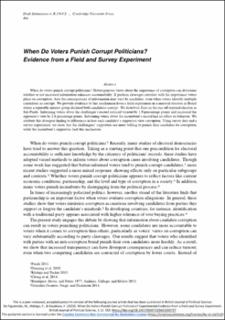| dc.contributor.author | de Figueiredo, Miguel F. P. | |
| dc.contributor.author | Hidalgo, Fernando Daniel | |
| dc.contributor.author | Kasahara, Yuri | |
| dc.date.accessioned | 2023-03-10T09:43:20Z | |
| dc.date.available | 2023-03-10T09:43:20Z | |
| dc.date.created | 2022-05-31T09:52:23Z | |
| dc.date.issued | 2022 | |
| dc.identifier.citation | British Journal of Political Science. 2022, . | en_US |
| dc.identifier.issn | 0007-1234 | |
| dc.identifier.issn | 1469-2112 | |
| dc.identifier.uri | https://hdl.handle.net/11250/3057616 | |
| dc.description.abstract | When do voters punish corrupt politicians? Heterogeneous views about the importance of corruption can determine whether or not increased information enhances accountability. If partisan cleavages correlate with the importance voters place on corruption, then the consequences of information may vary by candidate, even when voters identify multiple candidates as corrupt. We provide evidence of this mechanism from a field experiment in a mayoral election in Brazil where a reputable interest group declared both candidates corrupt. We distributed fliers in the runoff mayoral election in São Paulo. Informing voters about the challenger's record reduced turnout by 1.9 percentage points and increased the opponent's vote by 2.6 percentage points. Informing voters about the incumbent's record had no effect on behavior. We attribute this divergent finding to differences in how each candidate's supporters view corruption. Using survey data and a survey experiment, we show that the challenger's supporters are more willing to punish their candidate for corruption, while the incumbent's supporters lack this inclination. | en_US |
| dc.language.iso | eng | en_US |
| dc.publisher | Cambridge University Press | en_US |
| dc.relation.ispartofseries | British Journal of Political Science; | |
| dc.rights | Attribution-NonCommercial-NoDerivatives 4.0 Internasjonal | * |
| dc.rights.uri | http://creativecommons.org/licenses/by-nc-nd/4.0/deed.no | * |
| dc.title | When Do Voters Punish Corrupt Politicians? Experimental Evidence from a Field and Survey Experiment | en_US |
| dc.type | Peer reviewed | en_US |
| dc.type | Journal article | en_US |
| dc.description.version | acceptedVersion | en_US |
| dc.rights.holder | © The Author(s) | en_US |
| cristin.ispublished | true | |
| cristin.fulltext | original | |
| cristin.qualitycode | 2 | |
| dc.identifier.doi | https://doi.org/10.1017/S0007123421000727 | |
| dc.identifier.cristin | 2028296 | |
| dc.source.journal | British Journal of Political Science | en_US |
| dc.source.pagenumber | 18 | en_US |

